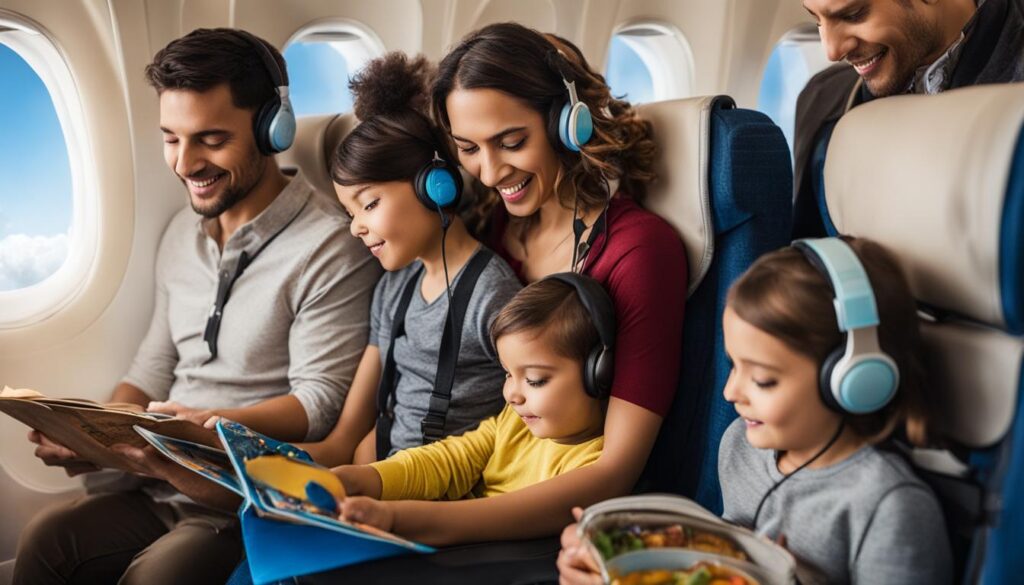If you are a family traveling with special needs children, you know how challenging it can be to create an inclusive and stress-free vacation experience. However, with the right tips and support, you can ensure a smooth and enjoyable trip for everyone. In this article, we will guide you through planning a family vacation with special needs children, covering everything from choosing the right destination to preparing for medical and safety concerns. With our advice, you can create lasting memories and unforgettable experiences for your family while catering to your child’s unique needs.
When it comes to family travel with special needs, proper planning is key. Let’s get started!
Understanding the Needs of Your Child
Traveling with special needs kids requires comprehensive planning to ensure a smooth and enjoyable trip for the whole family. One of the most important elements of this planning process is to understand the specific needs and requirements of your child. This includes their physical, cognitive, and emotional needs.
For example, if your child has mobility limitations, you need to consider the accessibility of the destination and accommodation options. If your child has sensory sensitivities, you may want to avoid crowded places or loud environments. If your child has dietary restrictions, you need to plan meals and communicate their needs to service providers.
Assessing your child’s travel requirements can be overwhelming, but it is essential for a successful trip. Start by making a list of your child’s needs and potential challenges, and then plan accordingly. Make sure to consult with your child’s healthcare providers if necessary and inform service providers of your child’s needs in advance.
Furthermore, it is crucial to communicate with your child and involve them in the planning process to ensure their comfort and engagement during the trip. Talk to them about the destination, activities, and any potential challenges they may face. Engage them in decision-making and encourage them to ask questions and express concerns.
Travel Tips for Understanding Your Child’s Needs:
- Make a list of your child’s needs and potential challenges
- Consult with your child’s healthcare providers
- Inform service providers of your child’s needs in advance
- Communicate with your child and involve them in the planning process
- Engage your child in decision-making and encourage them to ask questions and express concerns
Understanding your child’s needs is the foundation for a successful family trip. By taking the time to assess and plan for their requirements, you can ensure a comfortable and enjoyable experience.
Choosing the Right Destination
Planning an inclusive vacation for special needs children requires careful consideration of the destination. When choosing a location for your trip, make sure it offers accessible travel with children and special needs vacation planning to ensure your child’s safety and comfort.
Some destinations, such as national parks and theme parks, have programs and features that cater to special needs children. These might include wheelchair-accessible rides, sensory-friendly shows, and quiet rooms for children who need a calm environment.
Other factors to consider include the availability of medical facilities and accessible transportation. Choose a destination that has hospitals or medical centers near your accommodations in case of an emergency. When selecting transportation options, look for modes that cater to special needs children, such as wheelchair-accessible vans or airlines that offer priority boarding.
Table: Destinations with Inclusive Facilities and Activities for Special Needs Children
| Destination | Inclusive Facilities | Engaging Activities |
|---|---|---|
| Orlando, Florida | Wheelchair-accessible rides at Walt Disney World and Universal Studios | Sensory-friendly shows at SeaWorld |
| Yellowstone National Park | Wheelchair-accessible trails and campsites | Ranger-led programs for children with disabilities |
| San Diego, California | Sensory-friendly accommodations at hotels such as the Hilton San Diego Bayfront | Adaptive sailing and surfing lessons |
Researching potential destinations in advance and contacting resorts, hotels, or the park services to learn more about their facilities and resources for special needs children can help you make an informed decision and plan a successful trip.
Accommodation and Transportation Options
When traveling with special needs children, it is crucial to find the right accommodation and transportation options that cater to their requirements. One of the essential aspects is selecting wheelchair-accessible accommodations. Make sure to inquire about available accessibility features, such as wheelchair ramps, accessible parking spaces, and wide doorways.
Some hotels even offer additional support equipment, such as shower chairs or raised toilet seats, upon request. You can also search for accessible vacation rentals or home-sharing platforms that offer special needs-friendly amenities.
Another critical consideration is choosing transportation methods that cater to your child’s specific needs. Consider contacting the airline in advance to arrange for wheelchair assistance or special seating arrangements. If you plan to drive, pack necessary items such as booster seats and wheelchair-accessible vehicles, or opt for accessible transportation services.
Tip: Remember to research and book accommodations and transportation options well in advance to ensure availability and suitability for your travel needs.
Planning for Special Dietary Needs
If you or your special needs child has specific dietary requirements, it’s essential to plan ahead for meals during your travels. Here are some tips to ensure a safe and enjoyable dining experience for the whole family:
- Research restaurants and hotels before booking to ensure they can accommodate your dietary needs.
- Contact the food service department of your airline in advance to request special meals.
- Bring along non-perishable snacks and meals that meet your dietary requirements, in case of emergencies.
- When dining out, communicate clearly with the server about your dietary needs and ask for recommendations.
- Consider booking accommodations with kitchen facilities so that you can prepare customized meals for your family.
Remember that it’s always better to over-communicate your dietary restrictions than to assume that a restaurant or hotel can accommodate your needs. With prior planning and clear communication, you can ensure that your family’s dietary needs are met while enjoying inclusive family travel.
Sample Meal Plan
Here’s a sample meal plan for a family with a child who has gluten-free dietary requirements:
| Meal | Menu |
|---|---|
| Breakfast | Gluten-free cereal with almond milk, fresh fruit, and tea or coffee |
| Lunch | Grilled chicken salad with gluten-free dressing, sliced vegetables, and sparkling water |
| Dinner | Gluten-free pasta with homemade tomato sauce and meatballs, steamed vegetables, and gluten-free bread. For dessert, fresh berries with whipped cream. |
It’s always a good idea to bring along gluten-free snacks and additional meal options in case of emergency situations.
Preparing for Medical and Safety Concerns
Traveling with special needs children can be challenging, especially when it comes to medical and safety concerns. By taking the necessary preparations ahead of time, you can ensure a stress-free and safe vacation for your family.
Pack Necessary Medications
Make a list of all the medications your child requires, and ensure that you have enough to last for the entire duration of the trip. Keep medications in their original packaging, and pack them in your carry-on luggage to avoid loss or damage. If your child requires refrigerated medications, make arrangements with hotels ahead of time to guarantee proper storage.
Obtain Travel Insurance
Investing in travel insurance can provide peace of mind and financial protection for unexpected medical emergencies. Make sure to research travel insurance policies that offer coverage for pre-existing medical conditions and include medical evacuation services.
Create an Emergency Action Plan
In the event of an emergency, having an action plan can help you and your family take swift and appropriate action. Make sure to include emergency contact information, a list of medications and dosages, and any special medical needs. Share this information with all members of your travel party and keep it accessible at all times.
By taking these steps, you can ensure that your family is prepared for any medical or safety concerns that may arise during your special needs vacation.
Sensory-Friendly Travel Tips
If your child has sensory sensitivities, travel can be overwhelming. However, with some planning and preparation, you can create a sensory-friendly travel experience that provides a calm and supportive environment for your child.
Here are some practical special needs travel tips to reduce sensory overload so that you and your child can enjoy a stress-free trip:
- Choose the right time: If your child is sensitive to crowds or noise, consider traveling during off-peak season or times of the day when it’s quieter, such as early morning or late at night.
- Communicate your needs: Inform airlines, hotels, and restaurants about your child’s sensory sensitivities so that they can provide accommodations. Ask for quieter hotel rooms, special meals, or even earplugs on flights.
- Pack sensory items: Make sure to pack any comfort items that your child needs, such as a weighted blanket, noise-cancelling headphones, or a favorite toy. You can also bring along a sensory kit, which includes items that provide sensory input, such as fidget toys or chewelry.
- Create a calm space: Designate a calm space for your child to relax and unwind during travel. This could be a quiet corner of the airport lounge, a rental car, or even a pop-up tent.
- Stay close to routine: Maintaining some of your child’s regular routines, such as mealtime or bedtime, can provide a sense of security and comfort during the trip.
By implementing these sensory-friendly travel tips, you can ensure a comfortable travel experience for your special needs child while creating unforgettable memories.
Communication Strategies
When it comes to traveling with children who have special needs, communication is paramount. To ensure a smooth and stress-free trip, it is vital to be clear about your child’s requirements and communicate them effectively to hotel staff, airlines, and other service providers.
Start by preparing a list of your child’s needs, such as dietary restrictions, mobility requirements, and any sensory sensitivities. Be specific and clear in your requests, and ask for confirmation that your requests can be met. Don’t hesitate to ask questions or seek clarification if necessary.
Consider using visual aids, such as pictures or written descriptions, to help service providers understand your child’s needs. For example, if your child has a severe allergy, you can create a laminated card with a picture of the food they are allergic to and a clear, concise description of their reaction.
When communicating your child’s needs to service providers, be polite but firm in your requests. Remember that you are entitled to accommodations that will make your child’s travel experience safe and comfortable.
It can also be helpful to research service providers that specialize in special needs travel. Many hotels, resorts, and tour operators offer inclusive services that cater specifically to families with special needs children.
Remember that effective communication is a two-way street. Be approachable and open to suggestions from service providers and be prepared to work together to find solutions that work for everyone.
Managing Transitions and Routines
Traveling with special needs children can be challenging, particularly when it comes to managing transitions and maintaining familiar routines. Here are some tips to make this process smoother:
- Stick to a Schedule: Try to plan your trip around your child’s regular schedule as much as possible, including meal times, naptimes, and bedtimes. This consistency can help them feel more secure and in control.
- Prepare for Change: Even with careful planning, unexpected disruptions can occur during travel. Prepare your child for these changes in advance, so they are not caught off guard. For example, discuss delays at airports, potential changes in accommodations, and new meal options.
- Use Visual Cues: For children with cognitive or communication challenges, visual cues can provide structure and predictability. Consider using picture schedules or visual checklists to guide your child through daily activities.
- Encourage Relaxation: Traveling can be stressful for anyone, and children with special needs may experience heightened anxiety in unfamiliar surroundings. Make sure to prioritize relaxation activities, such as reading, listening to music, or taking a calming bath.
“Traveling with special needs children can be overwhelming, but with a few simple strategies, it is possible to ease the transition and make the journey more enjoyable for everyone.”
Engaging Activities and Entertainment
Traveling with special needs children can be a challenge, but with careful planning and consideration, you can create an inclusive and enjoyable family vacation experience. When it comes to planning engaging activities and entertainment options suitable for special needs children while traveling, it’s important to prioritize accessibility and inclusive facilities. Here are some tips:
Recommendations for Inclusive Attractions and Parks
When selecting attractions and parks, look for those that offer accessible facilities and activities for children with disabilities. Theme parks such as Disneyland and Universal Studios offer assistance for guests with special needs, including wheelchair rentals, special passes, and accommodations for sensory sensitivities. Children’s Museums and Aquariums are also great options, with interactive exhibits and programs designed for diverse needs.
Incorporate Cultural Experiences
Incorporating cultural experiences can be a fun way to learn and explore with your child. Look for cultural events and venues that cater to visitors with disabilities such as Sensory-Friendly Broadway shows in New York City like The Lion King or Aladdin.
“Traveling with special needs children can be a challenge, but with careful planning and consideration, you can create an inclusive and enjoyable family vacation experience.”
Consider Virtual Tours
If you are traveling to a destination that may be challenging to visit in person, consider virtual tours, which are particularly useful for children with sensory sensitivities. Many attractions and museums offer virtual tours that allow your child to experience the destination without having to visit in person.
Wrap-Up
Traveling with special needs children requires extra consideration, but it can be a rewarding and memorable experience for the whole family. By prioritizing accessibility and inclusion, and taking advantage of the many resources available, you can create an inclusive and engaging vacation experience that the whole family will cherish.
Conclusion
Embarking on a family vacation with special needs children requires careful planning and preparation, but the rewards are well worth the effort. By understanding your child’s specific needs and selecting the right destination, accommodations, transport, and activities, you can create a memorable, inclusive, and enjoyable travel experience for everyone.
Remember to communicate effectively with service providers, manage routines and transitions, and plan for medical and safety concerns. Don’t be afraid to ask for support and seek out sensory-friendly options to cater to your child’s needs.
Travel with special needs children is not only possible but can be a transformative and enriching experience for the whole family. By prioritizing inclusion, you can create lasting memories and experiences that will bring your family closer together.

















































